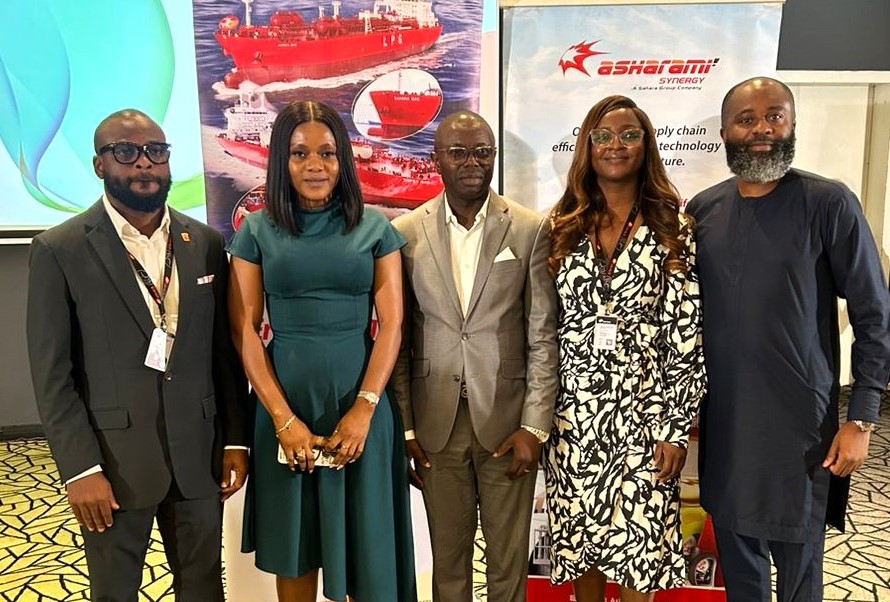Energy
Clean Energy: Asharami Synergy, NMDPRA, Customers Partner

Asharami Synergy, a leading Sahara Group Downstream Company has reiterated its commitment to promoting the adoption of cleaner fuels in the sector, working in collaboration with regulatory authorities and delivering exceptional fuel solutions responsibly.
At Asharami Synergy 2024 Customer Forum, Managing Director, Foluso Sobanjo pointed out that the company remained dedicated to spearheading the quest for environmental sustainability in Nigeria’s downstream operations across the sector’s value chain.
Sobanjo told the company’s customers that Asharami was delighted to serve as their preferred energy solutions provider, adding that Asharami had since commenced the supply of low sulphur fuels in line with the Afri-5 specifications prescribed by African Refiners and Distributors Association (ARDA) and in compliance with the provision of the Petroleum Industry Act (PIA) 2021 which limits the sulphur content in Gasoil/Diesel to 50ppm (parts per million).
He said, “Given our track record of transparency, integrity, and service excellence in the sector, we are using this forum to keep our esteemed customers abreast of new developments in the sector, especially the switch to the AFRI-5 low-sulphur specification which makes diesel appear lighter.
“This does not reduce the quality or performance of the product as all parameters remain the same as specified by the Standards Organization of Nigeria (SON).”
In the same vein, Head, Distribution System Storage Infrastructure, Lagos SW, Nigeria Midstream and Downstream Petroleum Regulatory Authority (NMDPRA), Engr. Oluwakayode Oyegoke, reassured the public that the new directive would help reduce pollution and promote the well-being of Nigerians.
“The NMDPRA would like to commend Asharami Synergy for providing this platform to help create more awareness and educate the buying public about the new fuel specifications. The Authority would also like to assure all stakeholders that the products in circulation meet all requirements for safety, quality, and environmental sustainability. The industry is evolving, and we have to move with the world towards cleaner energy. Economically, the transition to low-Sulphur fuels can attract investment, create jobs, and reduce the country’s carbon footprint,” he said.
On his part, Chief Marketing Officer, Asharami Synergy, Adeoti Onabolu commended the company’s customers for their patronage, stating, “serving you is a privilege we hold dear, and your satisfaction is the ultimate success factor and motivation for us to diligently and unceasingly work towards bringing energy to your lives and businesses responsibly.”
Onabolu said Asharami leverages Sahara Group’s global footprint and strategic investments to deliver exceptional fuel solutions and expand its operations across sub-Saharan Africa.
She said Asharami Synergy’s vertically integrated downstream business encompasses the entire value chain from top quality product sourcing to the final sales to the end consumers.
“We build, own, operate, maintain, and manage multiple storage facilities across several locations to the best international standards and manage an efficient, safe, and technology-driven logistics and supply operation via vessels, trucks, pipeline and rail to ensure product integrity and safety. Our International Standards Organisation (ISO) certifications reinforce Asharami’s distinctive mark of service excellence, quality, safety, innovation, and environmental sustainability,” she said.
The company’s Chief Operating Officer, Adekanmi Adesola said Asharami was commited to driving product quality and availability, competitive pricing, and service excellence as it continues to work with customers to co-create value responsibly.
Energy
Nigeria’s Gas Output Increases By 2.9%, Reaching 2.29 MSCF

Amid a slight increase in gas production, Nigeria’s oil output experienced a substantial rise in November 2024.
Gas production saw a 2.9% month-on-month (MoM) increase, reaching 2,292,951 million standard cubic feet (MSCF) from 2,292,471 MSCF in October.
However, on a year-on-year (YoY) basis, the growth was minimal, with a mere 0.02% increase in output for the first 11 months of 2024, compared to the same period in 2023.
READ MORE: Tinubu Mourns Ex-U.S. President Jimmy Carter, Celebrates His Legacy
The latest gas report from the Nigerian Upstream Petroleum Regulatory Commission (NUPRC) also revealed a 1.6% increase in domestic gas consumption.
A total of 606,658 MSCF was consumed locally, compared to 596,861 MSCF during the same period in 2023. Gas exports, meanwhile, rose by 6.9%, reaching 829,156 MSCF, up from 775,547 MSCF in the corresponding period of 2023.
This growth in exports continues to play a vital role in bolstering Nigeria’s foreign exchange earnings.
Despite these positive figures, sources close to the Ministry of Petroleum Resources (Gas) noted that oil remains the dominant force in Nigeria’s energy sector, with gas taking a secondary role.
On the other hand, the NUPRC’s oil production report revealed a remarkable surge.
Nigeria’s oil output, including condensates, rose by 13.3% year-on-year in November 2024, reaching 1.7 million barrels per day (bpd), up from 1.5 million bpd in November 2023. Month-on-month, oil production also increased by 10%, from 1.5 million bpd in October 2024.
Dr. Muda Yusuf, CEO of the Centre for the Promotion of Private Enterprises (CPPE), discussed the broader structural dynamics within Nigeria’s economy, highlighting the dominance of the non-oil sector.
In his 2025 Outlook, Dr. Yusuf noted that the non-oil sector contributed 94.43% to Nigeria’s GDP in Q3 2024, while the oil sector accounted for just 5.57%.
“However, the economy is characterized by a paradox of the oil sector contributing an estimated 90% of foreign exchange earnings, while the non-oil sector accounts for about 10%,” Dr. Yusuf said.
“This is a structural shortcoming in our economy which needs to be addressed, as sectors that contribute hugely to GDP have no corresponding contribution to foreign exchange earnings.”
He further emphasized the need to address the challenges faced by the non-oil sector, which include issues related to productivity, infrastructure, funding, and regulatory constraints.
“The policy implication is that more should be done to fix the challenges of productivity and competitiveness of the non-oil sector of the economy,” Dr. Yusuf added
Energy
JUST IN: NNPC Ltd Reopens Warri Refinery

The Nigerian National Petroleum Company Limited (NNPC Ltd) has announced that the 125,000-barrel-per-day Warri Refining & Petrochemicals Company (WRPC) in Warri, Delta State, has become operational.
This is coming about a month after the commencement of operations at the 60,000-barrel-per-day-old Port Harcourt Refinery.
The Group Chief Executive Officer, NNPC Ltd, Mele Kyari, made the disclosure during a tour of the facility on Monday.
ALSO READ: SERAP Urges Tinubu To Direct CCB To Publish President’s, VP’s, Others Assets
A video posted by Channels TV on Monday showed Kyari addressing a tour team, which included the Chief Executive Officer of the Nigerian Midstream and Downstream Petroleum Regulatory Authority (NMDPRA), Farouk Ahmed.
Before the tour commenced, Kyari explained that the inspection aimed to show Nigerians the level of work completed so far.
According to him, although the repairs on the facility are not yet 100 per cent complete, operations have commenced.
He said, “We are taking you through our plant. This plant is running. Although it is not 100 per cent complete, we are still in the process. Many people think these things are not real. They think real things are not possible in this country. We want you to see that this is real.”
Located in Ekpan, Uwvie, and Ubeji, Warri, the petrochemical plant produces 13,000 metric tonnes per annum (MTA) of polypropylene and 18,000 MTA of carbon black.
Commissioned in 1978 and managed by NNPC Ltd, the WRPC was built to supply markets in the southern and southwestern regions of Nigeria.
The mechanical completion of the facility was initially scheduled for the first quarter of 2024, according to the Spokesperson of the NNPC Ltd, Olufemi Soneye.
“Warri should be done by Q1 (first quarter) 2024,” Soneye stated.
The WRPC is one of Nigeria’s four refineries. Others include the old and new Port Harcourt Refining Company in Rivers State and the Kaduna Refining and Petrochemical Company in Kaduna State.
Energy
Dangote Partnership: MRS Urges Nigerians To Insist On N935/Litre Petrol Price Nationwide

MRS Oil Nigeria Plc, a prominent player in the Nigerian downstream oil industry, has implemented a new petrol price of N935 per litre across all its retail service stations nationwide.
The company has also called on Nigerians to monitor and report any outlets that fail to adhere to the new price structure.
Biztellers reports that this is consequent upon an announcement by the President of Dangote Industries Limited, Aliko Dangote, that the Dangote Petroleum Refinery has partnered with MRS Oil and Gas to offer petrol at N935 per litre at retail outlets, following a reduction in the ex-depot price from N970 to N899.50 per litre.
ALSO READ: Dangote Slashes PMS Price To N899.50k
It was gathered that MRS Oil Nigeria Plc has instructed all its outlets to implement the new price immediately, setting up a digital platform and monitoring team to ensure full compliance.
In a statement on Monday night, the company declared, “Petrol is now being sold at N935 at MRS Filling Stations nationwide. If you find any station not following this price, please report it. Call 08009447853 or email: NG-FMKPMGWHISTLEBLOWING@NG.KPMG.COM”
Emphasising the eco-friendly nature of its products, MRS Oil added, “We call on all petrol station owners to join MRS Oil Nigeria Plc in improving the supply chain of our beloved country, ensuring product quality and availability in every corner of Nigeria for the benefit of all Nigerians.”
In Lagos, commuters were seen queuing at MRS filling stations to purchase petrol, with many expressing their gratitude to the Dangote Petroleum Refinery and MRS Oil and Gas, urging other marketers to support the indigenous refinery rather than import off-spec products into the country.
A commuter at the MRS station at Alapere on the Lagos Ibadan Express way, Ibukun Phillips, could not hide her joy as her husband filled up their car.
“I am very happy today. This is a victory for Nigeria,” she said. “The price reduction is the best gift of the season. But beyond just the reduction, we are buying standard, eco-friendly petrol at a lower rate. My husband and I have decided we will only be using MRS from now on because we are confident in the quality of the product and supporting the economy.”
A commercial bus driver, Adio Ajibade described the price reduction as a great relief, especially during the festive season.
“The reduction is a great relief. It will reduce transportation costs and benefit Nigerians. God will continue to bless Alhaji Aliko Dangote,” he said.
A public affairs analyst and university lecturer, Dr. Tunde Akanni, said the collaboration between Dangote Petroleum Refinery and MRS Oil represents a significant step towards improving the affordability, quality, and sustainability of petroleum products in Nigeria.
According to Dr. Akanni, “this move will not only help ease the financial burden on Nigerians but also promote a more environmentally conscious approach to fuel consumption, benefitting both the economy and public health in the long term.”
















